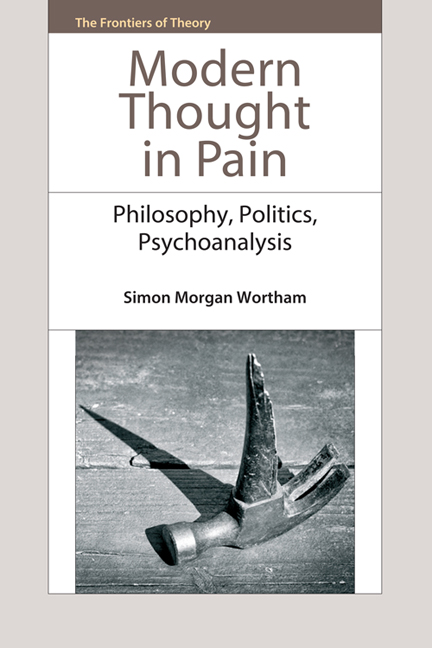3 - Distress II
Published online by Cambridge University Press: 05 September 2016
Summary
Masochistic Education
But who is this ‘Other’ who, whether cruelly or not, announces what they may not know? And who is the distressed infantia found, if Lyotard is to be believed, at the origin of the possibility of civil life? What is the nature of their pain, a pain at once inflicted and endured? Why submit to it, why silently succumb, without yet being able to attest to the reason why? From the perspective of the Deleuzian interpretation of masochism, it would be impermissible to view this quasi-self-induced distress of the child of civil education and address – this impossible and impossibly painful affirmation – as simply that of a masochist who is also a sadist in waiting. I venture this allusion to Deleuze's writing on Sade and Masoch not simply to license a somewhat arbitrary segue from one discourse to another, but to explore the possibility of some perhaps more deep-seated connections between the economy and practice of masochism outlined by Deleuze and the formation of civil life described by Lyotard. In particular, I want to show that some of the principal features and effects of what Deleuze sees as masochism's desire to educate the other correspond significantly with those of the Lyotardian ‘Other’ as master-teacher, and furthermore that through this comparison we might be able to complicate overly clear-cut distinctions between the ‘distressing’ instruction of such an ‘Other’, on the one hand, and, on the other, the emancipatory teaching of the ignorant schoolmaster a la Ranciere. In fact, as I hope to show, it may be that the master-teacher who for Lyotard forms a couple with the distressed infantia at the origin of civil life is much less the ‘knowing’, forceful stultifier at the centre of the explicatory tradition condemned by Ranciere, than they are potentially transformative educator working complexly at the (not necessarily self-identical) edges of what both masochism and emancipation might mean and do.
Let's begin with a brief summary of some of the main lines of Deleuze's thinking on masochism. In his essay ‘Coldness and Cruelty’, Deleuze is concerned to refute the idea, found in parts of Freud's work (and elsewhere), that sadism and masochism are just two sides of the same coin, forming a complementary or interchangeable pair, hence constituting a reversible opposition.
- Type
- Chapter
- Information
- Modern Thought in PainPhilosophy, Politics, Psychoanalysis, pp. 72 - 100Publisher: Edinburgh University PressPrint publication year: 2014

